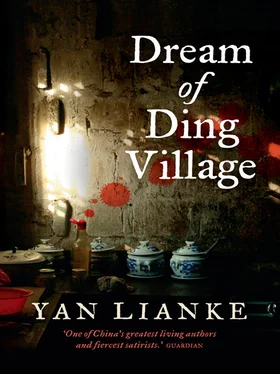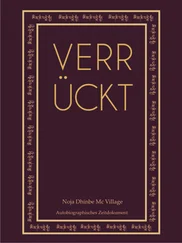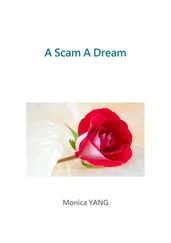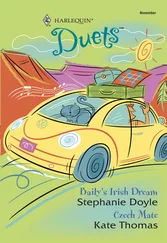My dad walked past Grandpa to a wooden door, painted the same stark shade of white as the walls. Grandpa hadn’t noticed the door before, because it blended in with the wall and was half-covered by an ink-brush portrait of the god of wealth. My dad pressed a latch, hidden beneath the portrait, and the door slid back, revealing a small inner room. He flipped on the light switch, and the room was suddenly as bright as day, as dazzling as a big-city street. To Grandpa, it was as dazzling as a dream, because the entire room was filled with cash. There was a large table heaped with something and covered with a white sheet. My dad pulled aside the sheet, revealing a tabletop piled with cash, 100-yuan bills bundled into 10,000-yuan stacks and secured with red rubber bands. These had been bundled into medium-sized bricks of 100,000 yuan, then into larger bricks of a million yuan, each neatly secured with a length of red silk ribbon tied into an elaborate butterfly knot. All the bills seemed to be brand new, and gave off a pungent scent of ink. Red silk ribbons and red, green, yellow and orange bills littered the table like brightly coloured pressed flowers. Grandpa couldn’t imagine why his son hadn’t put the money away somewhere safe, instead of leaving it lying around on a table. He was just about to ask, when my dad walked over to a chest of drawers and opened it. Every drawer was stuffed with cash. He threw open the cabinets and drawers, revealing even more stacks of cash. Everywhere you looked, there were bricks and stacks and piles of cash. Mountains of money in every colour of the rainbow.
The smell of ink was so strong you could choke on it. All that money made it hard to breathe. Between the bundles and bricks of money, my dad had stuffed mothballs and cloths to absorb moisture and prevent rot. The needle-sharp stench of lime, naphthalene and camphor irritated the nostrils, and mingled with the musty smell of the room that hadn’t been aired in days.
The clash of smells and colours made the room seem monstrous and bizarre. Being inside it was as unpleasant as standing at the edge of a septic pit before sunrise. My dad seemed used to it, as if he had been born and raised in just such a room, but Grandpa felt his throat growing tight, making it hard to breathe. He forced himself to breathe through his nostrils, and rubbed his nose to rid himself of the stench. Gazing around the room again, Grandpa wondered if he were dreaming. He knew he was prone to dreaming, so he tried pinching himself on the thigh, a method he had used before to wake up from his dreams. Usually he’d find himself in bed in his room at the school, but this time when he pinched himself, all he felt was a searing pain. Instead of waking up in his bed, Grandpa found himself still standing with my father in a tiny space more like a bank vault or a national treasury than the annexe of a guest bedroom. He felt as if he were drowning in a sea of cash, being suffocated by mountains of money. In addition to the smells he had noticed before, there was also a hint of rain wafting in from the courtyard, a scent he now recognized as gingko leaves. Maybe he wasn’t dreaming at all. Maybe he was awake and standing with his son amidst piles of ill-gained cash.
‘How much is there?’ Grandpa asked.
Dad smiled. ‘I’m not sure.’
‘What do you need with all this money? It’s more than you could spend in a lifetime.’
My dad seemed embarrassed. ‘Is it my fault this fever never ends? If it keeps on like this, I don’t know what I’m going to do. I just opened five new factories for the county, and we still can’t make enough coffins to keep up with demand. All the trees on the plain are gone, so I have to ship timber in from the northwest. And this month, I sent a dozen matchmaking teams into the villages to gather statistics and arrange posthumous matches. It’s been two weeks, and we’ve only managed to find matches for a third of the families who signed up.’
‘And this matchmaking business is more of your philanthropy?’
‘I’ve spent my whole life doing philanthropy,’ my dad smiled.
Grandpa turned away and was silent for a moment. ‘And the other cadres who live here, do they all have vaults like this?’
Dad nodded.
‘Filled with this much money?’
‘I don’t know,’ my dad shook his head. ‘We just do our jobs, and stay out of each other’s business.’
Grandpa didn’t say anything more. He gazed around at the piles of money, and then at his son, who was beginning to look sleepy.
‘Take my advice, Hui,’ he urged quietly. ‘And keep your family away from Ding Village. It’s not worth risking your life.’
My dad snorted. ‘I’m not worried. They can’t touch me now. Besides, Ding Village is my home. Not only am I planning to go back, in a few days I’ll be there to to exhume my son’s grave. I found him a wife, and we’re holding a big ceremony to celebrate. They won’t dare try to hurt me, especially when they see how much money I’m splashing out.’
Dad rubbed his bleary eyes and looked up at Grandpa with a smile, the smile of a filial son.
‘Get some sleep, Dad. You can sleep in here tonight, and dream sweet dreams. It’s the least I can do for my father.’
3
That night, lying asleep next to my dad’s cash-filled room, Grandpa did have dreams, although they weren’t the kind he expected. Before falling asleep, he was sure he would have visions of money, but he didn’t see a penny in his dreams. All he saw was me, stretching out my arms to him, and calling for him to save me.
My dad had found me a wife. Her name was Lingzi, and she was several years older than me. Her leg was a bit deformed. I suppose it was something she was born with. She also had epilepsy, which meant she suffered fits every couple of days. During one of her fits, she fell into a river and drowned. Of all the unmarried dead girls looking for husbands, she was the ugliest. But my dad agreed to the match anyway. Not only did my dad agree to the match, he jumped at the chance.
Lingzi’s dad was a very powerful man.
My dad came to Ding Village with a group of people, dug up my bones and put them in a new coffin. The coffin was made of gold, and it was even fancier than my uncle’s. They dug me up so they could take me to Kaifeng and bury me next to my dead wife. Lingzi’s dad gave us a nice plot in a funeral park overlooking the Yellow River. It was a good piece of land, the sort you see advertised in estate agents’ brochures: excellent location, southern exposure, river view, just steps away from the water, cool in summer and warm in winter. Someone had offered more than two million yuan for the land, because he wanted to turn it into a plot for one of his relatives, but Lingzi’s dad decided to set it aside for us, instead.
The day they dug me up, my dad showed up in Ding Village with twenty or so people. They lit incense at my grave, burned paper offerings, set off firecrackers, dug up my plain wood coffin and put my bones into another, fancier, golden coffin so they could take it to the funeral park in Kaifeng. But what my dad didn’t know was that I didn’t want to leave Ding Village in the first place. I didn’t want to leave Grandpa or my grave behind the school, and I was scared of going to a strange place. As soon as they lifted my golden coffin, I started thrashing around inside and screaming for my grandpa. Not screaming for my father. Screaming for dear life.
‘Grandpa! Don’t let them take me!’
My cries shook the heavens.
‘I don’t want to leave here! Don’t let them take me!’
Читать дальше












